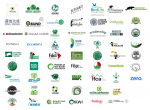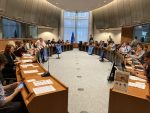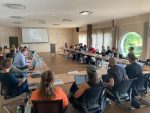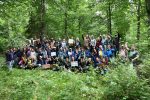Bremen, Brussels – June 12, 2025
Download position paper as PDF here!
In a position paper published today, 60 civil society organizations call for a fundamental reorientation of the EU bioeconomy strategy: The bioeconomy of the future must be ecologically sustainable and socially just.
The organizations criticize the fact that the current bioeconomy policy perpetuates an outdated economic model based on overuse and waste (for example through energy production from biomass). Real change requires a consistent break with this logic.
Large-scale biomass imports from the global South are not a responsible option. Residual and waste materials are also far from being able to cover the raw material requirements of future economic models. A sustainable bioeconomy must therefore above all drastically reduce the overall consumption of resources.
The statement was initiated by denkhausbremen, Oxfam, Fern, EPN, Ecodes and many other organizations committed to a responsible bioeconomy in Europe.
CSOs call for a future-proof EU Bioeconomy Strategy
In light of the revision of the EU Bioeconomy Strategy, civil society organizations are calling for a future bioeconomy that is socially just, ecologically sustainable and economically efficient.
There is no doubt that an economy primarily based on fossil resources is a model of the past. In this context, the bioeconomy, as an economic system fundamentally reliant on biomass, made from plants, animals and biological waste, presents itself as a potentially sustainable scenario for the future.
However, a closer examination reveals a more complex and troubling reality. As it stands, the bioeconomy risks exacerbating social inequalities, undermining human rights, and accelerating environmental degradation. Natural ecosystems are already under immense pressure from the growing demand for biomass.
The limits of what ecosystems can sustainably provide have long been exceeded. Without embedding this shift in a broader socio-ecological transformation and a substantial reduction in overall consumption, a mere substitution of fossil resources with biological ones would not solve the problem; it would deepen it.
We, the undersigned civil society organizations, therefore urge the European Union to develop a bioeconomy that truly recognises, respects and protects ecosystems’ ecological boundaries, thus protecting people, nature and our climate.
Staying Within Limits: Tackling the EU’s Growing Biomass Gap
The EU is on track to face a growing biomass gap, where the demand for biomass outpaces its supply. We support the European Commission’s analysis highlighting this risk, and stress that without swift and comprehensive action, the EU bioeconomy strategy will exacerbate ecological degradation and undermine climate and biodiversity goals.
First and foremost, it is essential to acknowledge that the production and consumption of biomass must not exceed planetary boundaries. The availability of biomass is inherently limited. The need to preserve and restore natural ecosystems, such as forests and wetlands, as vital carbon sinks and biodiversity reservoirs further restricts the potential supply of biomass. Meeting climate and biodiversity targets will therefore require the conservation and sustainable management of a significantly larger share of global land resources.
The assumption that biological waste and residual materials can bridge the biomass gap is misleading. Two key aspects are particularly relevant here. Materials often referred to as „residues“ may in fact serve essential ecological functions. For instance, so-called forest residues do not truly exist in a natural sense—nature does not produce waste. These materials play crucial roles in nutrient cycles and habitat preservation. Additionally, the technical and economic potential of residual biomass is already largely exploited, and as such, these resources do not represent a significant additional source for the expansion of the bioeconomy.
Given the reality of limited sustainably available biomass, it is imperative to use these resources as economically and ecologically efficiently as possible. This requires prioritizing their application in sectors where they offer the greatest added value and support a genuinely sustainable bioeconomy. For example, the principle of cascading use ensures that biomass is primarily used for high-value applications like food, materials or chemicals. Similarly, applying circular economy principles to the bioeconomy means minimizing waste, extending the lifespan of materials, and promoting reuse and recycling wherever possible.
Conversely, biomass should not be wasted on low-value or inefficient applications such as bioenergy production, singleuse paper products, or feed for industrial livestock. These uses are considered inefficient because they deliver minimal climate or resource-efficiency benefits per unit of biomass, often lead to high emissions, and compete directly with higher-value or more sustainable uses of the same resources.
Putting Justice at the Centre of the Bioeconomy
The EU must not attempt to close its biomass gap by increasing imports of biomass from the Global South, an approach that risks deepening extractivism and perpetuating historical injustices and human rights abuses. Many bioeconomy scenarios envision securing biomass supplies through large-scale imports. This reliance raises serious concerns regarding global equity and sustainability. In many regions of the world, industrial-scale agriculture and forestry already contribute to the displacement of local communities, the exploitation of labour, and the degradation of ecosystems. A substantial increase in EU biomass demand, as projected in several transition models, risks intensifying these social and ecological injustices. It reflects a continuation of the Global North’s overconsumption at the expense of the Global South.
To address these challenges, a dual strategy is essential: reducing overall resource and energy consumption in the EU through binding demand reduction policies and sufficiency strategies, only using biomass for higher-use values, and enforcing strong ecological and social sustainability standards across global supply chains. A fair transition must confront the structural inequalities behind overconsumption, ensuring that the wealthiest parts of society and regions, those most responsible for emissions and resource depletion, cut their consumption first and fastest. A just bioeconomy must also uphold the rights and agency of vulnerable communities, making sure decarbonisation efforts do not come at the expense of people or the planet. Only by putting justice at the centre and reducing inequality can the EU build a truly sustainable and inclusive bioeconomy.
Avoiding Policy Incoherence towards a Sustainable Bioeconomy
The bioeconomy is a cross-cutting issue that intersects with a wide range of EU regulations, strategies, and policy initiatives, but some of these regulations contradict and undermine each other. Therefore, the development of a future EU Bioeconomy Strategy must be carefully aligned with existing frameworks. It is crucial to reduce the contradictions between different policy instruments and avoid that they result in increased pressure on ecosystems or the violation of human rights.
For instance, conservation targets set out under the Nature Restoration Law must not be undermined by an increase in biomass demand driven by an updated Bioeconomy Strategy. There is a particular risk that intensified logging could lead to the further degradation of forests, thereby reducing even more of their capacity to contribute to climate goals in the LULUCF (Land Use, Land Use Change and Forestry) sector, and instead turning them into net sources of carbon emissions, as it is already happening in Germany, Finland or Estonia.
Moreover, the Renewable Energy Directive continues to stimulate additional demand for wood and crops, placing it in direct competition with material uses that should be prioritized in a sustainable bioeconomy. Another example of conflicting policy objectives is the continued permission of the widespread use of single-use paper products within European markets under the recently adopted Packaging and Packaging Waste Regulation. This is contrary to the principles of a circular bioeconomy.
The undersigned civil society organizations see these recommendations as a concrete contribution to building a responsible and future-proof bioeconomy. The upcoming revision of the EU Bioeconomy Strategy could help us take an important step in this direction.
Signatories (as of 13th June 2025):
ARA – Germany
Association For Promotion Sustainable Development – India
Association pour la Conservation et la Protection des Écosystèmes des Lacs et l’Agriculture Durable – DR Congo
Aurora – Sweden
AXIAL, Naturaleza y Cultura – Paraguay
Bank Information Center – USA
BankTrack – Netherlands
Biodiversity Conservation Center – Russia
BirdLife Europe and Central Asia – Belgium/International
BirdLife Sverige – Sweden
Bond Beter Leefmilieu – Belgium
Canopea – Belgium
CEDENMA – Ecuador
Center for Climate Change – North Macedonia
Centro de Documentación en Derechos Humanos “Segundo Montes Mozo SJ” – Ecuador
ClientEarth – Belgium
CliMates – France
Comité Schone Lucht – Netherlands
denkhausbremen – Germany
Deutsche Umwelthilfe – Germany
Deutscher Naturschutzring (DNR) – Germany
Earth Thrive – UK/Serbia
Ecodes – Spain
ECOS – Belgium
eco-union – Spain
Environmental Paper Network – International
Evo-Tiras International Association of River Keepers – Moldova
Fair Finance International – International
FDCL-Center for Research and Documentation Chile-Latin America – Germany
Fern – Belgium
Finnish Association for Nature Conservation – Finland
Focus Association for Sustainable Development – Slovenia
Foodrise – Netherlands
Forests Now – Poland
Forum Ökologie & Papier – Germany
Fundación Pachamama – Ecuador
Gemeinwohl-Ökonomie Deutschland – Germany
Greenish Foundation – Egypt
Instituto para el Futuro Común Amerindio IFCA – Honduras
Landelijk Netwerk Bossen- en Bomenbescherming – Netherlands
Latvian Ornithological Society – Latvia
Leefmilieu – Netherlands
Naturwald Akademie – Germany
Oxfam – Belgium/International
Partnership For Policy Integrity (PFPI) – USA
Pracownia na rzecz Wszystkich Istot – Poland
Protect the Forest – Sweden
Quercus – Associação Nacional de Conservação da Natureza – Portugal
Red de Acción por los Derechos Ambientales RADA – Chile
Rettet den Regenwald – Germany
Salva la Selva – Spain
Stichting Mobilisation for the Environment – Netherlands
Stowarzyszenie Nasz Las Tulecki – Poland
The Royal Society for the Protection of Birds (RSPB) – UK
Transport & Environment – Belgium
United Kingdom Without Incineration Network (UKWIN) – UK
Univerisité Catholique de Lille – France
Wild Europe Foundation – Netherlands
Zero Waste British Columbia – Canada







